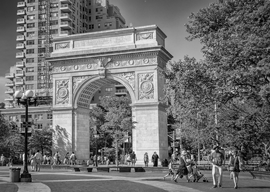
November 29, 2014

Washington Square Park, New York
Source: Shutterstock
The leaves are falling nonstop, like names dropped in Hollywood, and it has suddenly turned colder than the look I got from a very pretty girl in a downtown restaurant. I had gone outside for a cigarette while dining with Gay Talese, the writer, when two men and a lady came out looking for a cab. The scene was straight out of an F. Scott Fitzgerald story: “I love you, I’ll take you home,” said one of the young men. “I love you more, let me take you home,” said the other.
Both were well dressed and spoke proper English. There was nothing else to do but for me to butt in and I did. “I love you the most, and I’ve got a car and driver waiting,” I said to her.
That’s when I got the cold stare, although to their credit, the two preppies laughed. The three of them wandered off into the cold night looking for a taxi. I went back in and had a very good evening with the writer and a beautiful African-American model. Such are the joys of the Big Bagel. Anything can happen at any moment.
Speaking of Fitzgerald, a new musical adaptation of his 1920 novel This Side of Paradise has opened on 42nd street, one I plan to see if I can find the girl that gave me the cold look on that freezing night in SoHo. She looked like an upper-class flapper, a perfect companion for a pre-jazz-age cocktail before we hit the Great White Way and enjoy Scott’s autobiographical novel set to music. In the review I read, the musical takes place in Princeton’s ivied halls, and if memory serves (I read the novel when I was in prep school), Amory Blaine, the hero, is in hot pursuit of a debutante named Rosalind.
Fitzgerald called himself the romantic egotist in the novel, one that put him on the map at an age when his contemporary, Papa Hemingway, was a starving unknown living in a cold flat in Paris. We tend to forget how unbearably young and attractive those writers were back before the booze got to them. And how well dressed! And what perfect manners they affected. Today’s scribes tend to equate slovenly dress and boorish manners with talent. The aforementioned Gay Talese is an exception, but he is, after all, 82 years of age.
Gay is a dandy, and during dinner he recounted how his father was an Italian immigrant who became a tailor but who never managed to save any money because he insisted on tailoring beautiful suits with very expensive material few people could afford. (His mother kept the family afloat.) I have never seen Talese in the 30 or more years I’ve known him without a perfectly cut suit and waistcoat, and always wearing a hat, the way men used to do when manners were still more important than money. One thing I’ve noticed recently on some more or less ugly types, is porkpie hats, things they never tip or remove indoors or in the presence of ladies.
That’s something Joe Alsop would not be caught dead doing. Alsop was an American aristo and a very powerful columnist of my political persuasion. A relation of Teddy Roosevelt, his Sunday night dinners in Washington were more sought after than a White House invite, and Joe, whom I met in Greece on a couple of occasions when he covered the Colonel’s coup d’état, was as charming a cosmopolite as there was on this side of the pond. He was also a closeted gay who, when honey trapped by the Soviets in Moscow, immediately went to the CIA and told the truth.
A sharp dresser, he was envied for his background and good connections by lesser hacks, and although he’s been dead a long time, here’s a review by one Louis Menand of a book about the Cold War period, when Joe and his brother Stewart reigned supreme in Georgetown: “When he showed up for work at the Herald Tribune in the middle of the Depression, he was wearing a bespoke suit, silk shirt, and hand-sewn shoes from Peal in London.” How to stick the knife in without getting blood on one’s hands, I call it. What’s wrong with wearing a bespoke suit or silk shirt, as the hack intimates? The hack also writes about an ostentatious air of upper-class refinement that Alsop affected. Well, not to me, and Joe liked me and thought I was cute 45 years ago. He once drank quite a bit in an Athenian taverna and started to look me up and down, and I said to him, now, now, Mr. Alsop, no funny business, it wouldn’t be fair to Greek girls, and he burst out laughing and bid me good night.